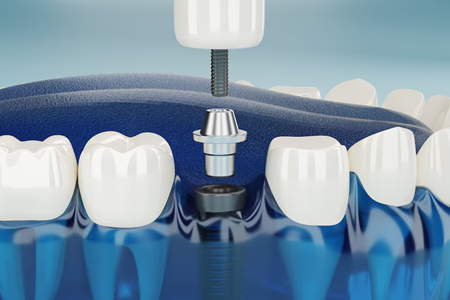Dental implants have revolutionized the way we approach tooth loss and restoration. For those who are missing teeth, dental implants offer a permanent, durable, and natural-looking solution that can restore both function and aesthetics. Whether you have lost teeth due to injury, decay, or gum disease, dental implants can provide a long-term solution to restore your smile.
In this blog, we will explore all aspects of dental implants, including what they are, how they work, the benefits, the procedure, and aftercare.
What Are Dental Implants?
A dental implant is a titanium post or frame that is surgically placed into the jawbone beneath the gums. This post serves as a replacement root for a missing tooth. After the implant is placed, it fuses with the bone in a process called osseointegration, providing a sturdy foundation for a crown, bridge, or denture. Implants are designed to mimic the function and appearance of natural teeth, making them an ideal solution for patients looking to restore their smile and chewing function.
Dental implants come in several types:
- Single Implants: Used to replace a single missing tooth.
- Multiple Implants: Used to replace several missing teeth.
- All-on-4 Implants: A technique used to replace an entire arch of teeth with four strategically placed implants.
- Mini Implants: Smaller in size and typically used for patients with less bone density.
How Do Dental Implants Work?
The process of getting a dental implant involves several stages:
- Consultation and Planning: The first step involves a detailed consultation with your dentist to assess your oral health, bone density, and overall suitability for dental implants. X-rays and 3D imaging are often used to create a customized treatment plan.
- Implant Placement: During the surgery, the dentist will make an incision in the gum tissue and place the titanium implant into the jawbone. The procedure is typically performed under local anesthesia to ensure comfort. If necessary, bone grafting may be done to ensure the jawbone has enough volume to support the implant.
- Osseointegration: After the implant is placed, it needs time to heal and fuse with the surrounding bone. This process can take several months. During this period, the implant becomes a stable and permanent part of the jaw.
- Abutment Placement: Once the implant has successfully integrated with the bone, an abutment is attached to the implant. The abutment serves as a connector between the implant and the crown or other restoration.
- Restoration: Finally, a custom-made crown, bridge, or denture is placed on the abutment. The restoration is designed to match the color, shape, and size of your natural teeth, ensuring a seamless, beautiful smile.
Benefits of Dental Implants
Dental implants offer numerous advantages over other tooth replacement options like dentures or bridges. Here are some of the key benefits:
- Durability: Dental implants are incredibly durable and can last for decades when properly cared for. Unlike dentures, which may need to be replaced every few years, implants provide a permanent solution.
- Natural Look and Feel: Dental implants are designed to blend seamlessly with your natural teeth. The crown is customized to match the color, shape, and size of your existing teeth, so the result is a natural, attractive smile.
- Improved Function: Implants restore full chewing function, allowing you to enjoy a wider variety of foods. They are securely anchored to the jawbone, so you don’t have to worry about them shifting or slipping like traditional dentures.
- Preservation of Bone Health: One of the most significant benefits of dental implants is that they help prevent bone loss in the jaw. When a tooth is lost, the jawbone can begin to deteriorate over time. The implant stimulates the bone, helping to maintain its density and structure.
- Improved Speech: Dentures can sometimes slip or move, causing difficulty with speech. Since dental implants are securely anchored in the jawbone, they help restore natural speech patterns.
- Enhanced Self-Confidence: A full set of teeth can significantly improve your appearance and boost your confidence. With dental implants, you can smile, speak, and eat without worrying about the appearance or functionality of your teeth.
Who Is a Good Candidate for Dental Implants?
Most healthy adults who are missing teeth are candidates for dental implants. However, certain factors need to be considered to determine whether you are a good candidate for the procedure:
- Sufficient Bone Density: For a dental implant to be successful, you must have enough healthy bone in the jaw to support the implant. If you have significant bone loss, you may need bone grafting before an implant can be placed.
- Good Overall Health: Patients with chronic health conditions like diabetes or heart disease may need to consult with their physician to ensure they are healthy enough for surgery.
- Healthy Gums: Your gums must be free of infection or disease to ensure the implant has a good chance of success.
- Non-Smoking: Smoking can negatively affect the healing process and increase the risk of implant failure. Non-smokers typically have better success rates with dental implants.
The Procedure: What to Expect
The dental implant procedure is generally safe, but like any surgery, it comes with some risks. Here’s what you can expect throughout the process:
- Consultation and Evaluation: Your dentist will conduct a thorough examination and create a customized treatment plan tailored to your needs.
- Surgical Procedure: The implant is placed into the jawbone, and you will be given anesthesia to ensure comfort. You may experience some swelling and discomfort during recovery.
- Healing and Integration: The healing process typically takes several months, during which the implant integrates with the bone. You will be given specific instructions on how to care for your implant during this time.
- Placement of Restoration: After the implant has fused with the bone, the abutment is placed, and the final restoration (crown, bridge, or denture) is attached.
Aftercare and Maintenance
Proper aftercare is essential to ensure the longevity of your dental implants. Here are some tips for maintaining your implants:
- Oral Hygiene: Brush your implants and natural teeth at least twice a day and floss regularly. Consider using an antimicrobial mouthwash to reduce the risk of infection.
- Avoid Smoking: Smoking can delay the healing process and increase the risk of implant failure, so it’s best to quit or avoid smoking.
- Regular Check-ups: Visit your dentist regularly for follow-up appointments to monitor the health of your implants and surrounding tissues.
- Diet: After receiving your implants, stick to a soft food diet initially, gradually returning to normal foods as healing progresses.
Dental implants are a transformative solution for those who have lost teeth, offering benefits that go beyond just aesthetics. They provide durability, a natural look, and improved functionality, allowing you to live life to the fullest without worrying about your teeth. At Mark Dentals, we specialize in dental implant procedures and are dedicated to providing high-quality care to restore your smile and confidence. If you’re ready to take the next step toward a brighter, healthier smile, contact us today to schedule a consultation.

